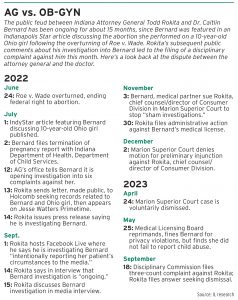Subscriber Benefit
As a subscriber you can listen to articles at work, in the car, or while you work out. Subscribe NowFor the second time in four years, the Indiana attorney general is facing lawyer discipline charges.
On Sept. 18, the Indiana Supreme Court Disciplinary Commission filed a three-count disciplinary complaint against Attorney General Todd Rokita, In the Matter of Theodore Rokita, 23S-DI-258. That follows Rokita’s predecessor, Curtis Hill, whose law license was suspended for 30 days in 2020.

In Rokita’s case, the Disciplinary Commission is alleging the Republican AG violated three Indiana Rules of Professional Conduct through his comments about Dr. Caitlin Bernard, an Indianapolis OB-GYN who in July 2022 publicly discussed the abortion she performed on a 10-year-old Ohio girl. The commission alleges that through his comments, Rokita violated confidentiality requirements and “caused irreparable harm to Dr. Bernard’s reputational and professional image.”
In his answer, Rokita admits that his comments “could reasonably be considered to have violated Indiana Rule(s) of Professional Conduct,” but he is also demanding “strict proof thereof” and is seeking dismissal.
The charges
The commission’s complaint alleges Rokita violated Rules of Professional Conduct 3.6(a), 4.4(a) and 8.4(d).
The alleged violation of Rules 3.6(a) and 4.4(a) relate to comments the AG made on the Fox News program Jesse Watters Primetime.
On July 13, 2022, Rokita went on the show and discussed Bernard, who had entered the national conversation after she revealed the Ohio girl’s abortion earlier that month in an article in the Indianapolis Star. In his comments to Watters, Rokita described Bernard as an “abortion activist acting as a doctor — with a history of failure to report.”
Since the IndyStar article had been published, Rokita’s office had been working to confirm whether Bernard properly reported the Ohio girl’s abortion and abuse to authorities. The complaint says Bernard filed a termination of pregnancy report in the girl’s case on July 2, then emailed a copy of the report to the Indiana Department of Child Services the same day.
Rokita then publicly discussed his office’s investigation into Bernard on five additional occasions:
• On July 13, when he made public a letter he had sent to Gov. Eric Holcomb regarding Bernard’s reporting of the Ohio girl’s case.
• On July 14, when he issued a press release saying his office was “investigating the situation” involving Bernard.
• On Sept. 1, during a Facebook Live broadcast, when he said, “And just as background, based on a doctor intentionally reporting her patient’s circumstances to the media, my office has undertaken a review of that act in response, again to public concern.”
• On Sept. 14, when he said in a newspaper interview that the investigation into Bernard was “ongoing.”
• On Sept. 15, when he discussed the investigation in another media interview.
The comments culminated in the Nov. 30, 2022, filing of an administrative action against Bernard’s medical license. That action resulted in Bernard being reprimanded and fined $3,000 for violating patient privacy laws, but a finding that she did not fail to report child abuse.
Because Rokita made his comments before the administrative action was filed, the Disciplinary Commission alleges he violated Rule of Professional Conduct 8.4(d).
In addition to his public comments, the commission is also citing for Rokita for “burden(ing) the court system and caus(ing) additional systems and logistical issues for the Medical Licensing Board to navigate.” That’s in part because the administrative hearing against Bernard had to be held in a larger room than normal due to the case’s notoriety.
 The response
The response
In his answer, Rokita sought dismissal and argued, among other things, that the complaint violates the separation of powers and free speech protections.
Rokita asserted confidentiality was not required in this case because Bernard “intentionally and publicly (through her attorneys and through the media) first disseminated the very confidential complaints contemplated by the confidentiality statute referenced by the commission” (Indiana Code § 25-1-7-10(a)); “violated her duties of confidentiality by disclosing her patient’s condition and treatment to the press at a political function”; and “confidentiality was further breached by publicly discussing patient information, including in an MSNBC interview on July 6, 2022.”
Additionally, he claimed that the “scope and contours of the Statute” are unclear, and that it’s unclear whether the statute applies to the elected AG or only to those who work in the AG’s office.
Finally, Rokita claimed the disciplinary action violates Indiana separation of powers, the First Amendment and Article 1, Section 9 of the Indiana Constitution, although those arguments were not further explored in the initial answer.
“… Respondent requests that this cause of action be dismissed, with costs paid by the Disciplinary Commission, and all other relief just and proper in the premises,” the answer concluded.
Specifically addressing the alleged privacy violations, Rokita wrote, “besides the licensing enforcement action, there were other overlapping and intersecting non-confidential matters raised by the license holder’s privacy violations, which Respondent’s statements address. Further, the Attorney General has a legal duty to keep the public informed of the Office’s action and decisions; and, it is unclear how the contours of the confidentiality afforded by the Statute interact and intersect with the Attorney General’s duty to keep the public informed about non-confidential matters.”
Rokita’s answer also challenged the commission’s reference of a civil action filed against him and his chief counsel/director of consumer protection by Bernard and her medical partner. A Marion Superior Court judge ultimately denied the doctors’ request for an injunction, although the judge did find Rokita had “clearly violated” Indiana law by discussing the Bernard investigation.
The case was subsequently voluntarily dismissed, which, according to Rokita, means “such causes of action are treated as if they never happened. Consequently, it is improper for the Commission to include Paragraphs in this Complaint that reference a cause of action that was voluntarily dismissed.”
Finally, as to the allegations that Rokita burdened the Medical Licensing Board, he said it was Bernard, not him, who “intentionally” caused the publicity.
“Respondent further provides that the location and size of the venue for a hearing is not recognized as ‘prejudicial’ to the administration of justice and Respondent refers … the Commission to such programs as the ‘Appeals on Wheels’ which encourage public access and transparency by holding hearings in larger, more public venues.”
The response
In a press release, Rokita said he “remain(s) responsible for everything my office and I do and say. And like everything, I see this situation as an opportunity to learn and improve for the next time.”
“Hoosiers in the largest number on record, elected me Attorney General because they knew they were getting a passionate fighter who — like them — is beating back the culture of death, grievance and transanity being pushed by radicals in workplaces, schools, media and government,” his statement said. “This work certainly includes vindicating vulnerable children (our most precious gift) for having their privacy rights unlawfully violated — without consent — by healthcare providers to further their political agenda and their ‘bottom line.’ I won’t stop in this and my other work.”
Rokita is being represented in the disciplinary action by Indianapolis attorney James Ammeen of Ammeen Valenzuela Associates LLP and Washington, D.C., attorney H. Christopher Bartolomucci of Schaerr Jaffe LLP.
Bernard’s attorney, Kathleen DeLaney of DeLaney & DeLaney LLC in Indianapolis, released a statement saying only, “Our legal team had no involvement in the recent charges filed and therefore cannot comment on them. We will watch how the Disciplinary Commission process proceeds and let the complaint speak for itself.”
What’s next?
The disciplinary charges against Rokita bring up the same questions that were raised in 2019, when former AG Hill was first charged in an attorney discipline matter — namely, what happens if the elected AG has a suspended law license?
The Legislature sought to address that issue in 2020 via Senate Bill 178, which, as amended, would have changed the statutory language describing the qualifications of the attorney general to exclude an attorney who has been disbarred or suspended for 30 days or more.
That measure ultimately did not pass, and Hill’s chief deputy, Aaron Negangard, “assume(d) responsibility for the legal operations of this office” during Hill’s suspension.
Hill’s discipline seemingly played a role in his losing his bid for the Republican nomination for Indiana attorney general in 2020. Instead, the party put its support behind Rokita, a late-comer to the election who said he decided to run against Hill because the latter had been “very badly wounded.”
Rokita is seeking reelection in 2024.•
Please enable JavaScript to view this content.

